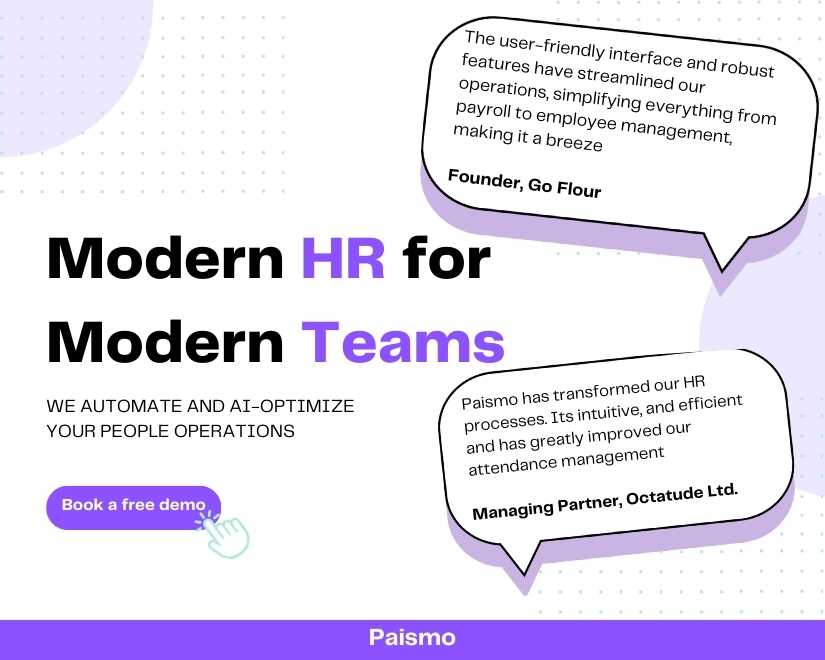Highlights
- Emiratisation aims to increase the employment of UAE citizens while reducing reliance on expatriate labour.
- Companies must meet sector-specific quotas, with penalties increasing annually for non-compliance.
- Tools like Paismo simplify the tracking, reporting, and management of Emiratisation goals efficiently.
- Strategies include attracting talent, developing employees, collaborating with institutions, and aligning Emiratisation with business goals.
- Best practices cover gap analysis, governance, cultural training, progress monitoring, and addressing common compliance challenges.
The UAE government is encouraging private-sector companies to hire more local citizens through its Emiratisation policy. For businesses new to this process, understanding the requirements can be challenging. By following the right strategies, companies can stay compliant, avoid penalties, and benefit from government incentives. Utilizing tools such as HR software UAE and human resources software can simplify tracking, reporting, and managing Emiratisation goals.
This blog breaks down the key requirements and practical steps employers need to implement to meet Emiratisation standards successfully.
What Is Emiratisation and Why Does It Matter in the UAE?
Emiratisation is a UAE government policy that aims to increase the employment of Emirati citizens, reducing the nation's reliance on expatriate labor. By promoting local talent, the Ministry of Human Resources and Emiratisation ensures that workforce development aligns with the country’s goals.
It matters because it helps build a balanced and sustainable workforce while supporting national growth. In addition, following Emiratisation requirements helps organizations avoid penalties and demonstrates their commitment to responsible employment, making it essential for every business in the UAE.
Important Emiratisation Requirements for UAE Employers
Emiratisation in UAE is a long-standing government initiative aimed at increasing the participation of local citizens in the workforce. The policy has evolved since the 1990s, and as of 2024, the Ministry of Human Resources and Emiratisation (MoHRE) requires more companies to participate. Over 12,000 firms with 20–49 employees across 14 industries are required to hire at least one Emirati in 2024, increasing to two in 2025. To make compliance easier, companies are increasingly using tools like Paismo to track quotas, monitor progress, and manage Emiratisation requirements efficiently.
Here are the key Emiratisation requirements and compliance guidelines:
Sector-Specific Emiratisation Quotas and Targets
Employers must meet defined hiring quotas:
- Companies with 50+ employees: 2% Emiratis in the workforce annually.
- Companies with 20–49 employees: At least one Emirati in 2024, increasing to two in 2025.
Applicable sectors include:
- Information and communications
- Financial and insurance activities
- Real estate
- Professional, scientific, and technical activities
- Administrative and support services
- Education
- Healthcare and social work
- Arts and entertainment
- Mining and quarrying
- Manufacturing
- Construction
- Wholesale and retail trade
- Transportation and warehousing
- Hospitality
- Other services
Emiratisation Points System and Tiers
Companies earn points when they hire, train, and retain Emirati employees. Points can be redeemed for lower government fees or event sponsorships. Firms are also classified into three tiers, with each tier offering different benefits and incentives, which encourage employee engagement by motivating organizations to invest in their local workforce.
Reporting and Compliance Obligations
Employers must provide a safe and proper workplace, adequate training, and the necessary tools. They are also required to:
- Obtain a work permit from MoHRE for the Emirati employee
- Finalize the employment contract
- Pay salaries through the Wages Protection System (WPS)
- Register the employee in pensions and social security within one month
- Report any contract changes affecting program eligibility
Penalties for Non-Compliance
Companies that fail to meet Emiratisation requirements are subject to strict penalties, which increase annually in proportion to the number of employees. The following table summarizes the monthly and yearly penalties for non-compliance:
| Employee Size | 2022 | 2023 | 2024 | 2025 | 2026 |
| 50+ employees (Monthly) | 6,000 AED | 7,000 AED | 8,000 AED | 9,000 AED | 10,000 AED |
| 50+ employees (Yearly) | 72,000 AED | 84,000 AED | 96,000 AED | 108,000 AED | 120,000 AED |
| 20–49 employees (Yearly) | 72,000 AED | 84,000 AED | 96,000 AED | 108,000 AED | 120,000 AED |
This table clearly illustrates how penalties escalate each year for companies that do not meet the required Emiratisation quotas.
Practical Strategies to Meet Emiratisation Requirements
Several perks are available when you meet the Emiratisation requirements. So, what strategies can you use to stay compliant and achieve business success? Tools like Paismo make these strategies practical and efficient, as without Paismo, tracking quotas, monitoring progress, and managing employees effectively become much harder.
To help you implement these strategies effectively, consider the following steps:
- Attracting and Recruiting Emirati Talent
Employers should use career fairs, LinkedIn, and social media to attract qualified Emirati candidates. Offering competitive packages and benefits helps secure skilled talent effectively.
- Developing and Retaining Emirati Employees
Besides employing new Emirati talent, retaining existing employees is crucial. Invest in their professional growth using a learning management system to provide training, upskilling, and career development opportunities, ensuring employees remain relevant and motivated.
- Collaborating with Educational Institutions and Government Entities
Partner with universities and training institutes to access fresh Emirati talent. Maintain close ties with government entities to stay updated on rules, quotas, and incentives.
- Aligning Emiratisation with Business Goals and Needs
Align Emiratisation initiatives with your business objectives by placing Emirati employees in roles where they add strategic value. With Paismo, tracking compliance and workforce alignment becomes seamless.
Best Practices for Managing Emiratisation in UAE Organizations
Here are practical steps to effectively manage Emiratisation in UAE organizations:
- Plan and conduct a workforce gap analysis to compare current skills with required ones, helping your team address shortages. Use structured workflows to streamline this process.
- Establish governance with clear responsibilities and well-defined processes to track progress and accountability.
- Provide cultural‑awareness training to promote mutual respect and understanding across the organisation.
- Monitor progress at key milestones to assess compliance, identify any issues, and refine strategies accordingly.
- Align Emiratisation goals with your business objectives so Emirati employees can contribute strategically.
- Invest in retention through development opportunities and growth for your Emirati workforce.
- Partner with educational institutions and government bodies, and refer to the UAE government’s Emiratisation portal for detailed policy information.

Common Issues in Emiratisation Compliance
Emiratisation compliance can be complex, with multiple processes and strict penalties for non-compliance. To support organizations in handling these challenges, tools like Paismo and its performance suite provide efficient ways to manage quotas and monitor progress.
Below are some of the most common issues companies face and ways to address them:
- Hiring Top Emirati Talent: Leverage career fairs, social media, and referrals, and assign a dedicated team to oversee the recruitment process.
- Maintaining a Cross-Cultural Workforce: Provide cultural awareness and sensitivity training to ensure employees understand and respect Emirati workplace norms and values.
- Meeting Required Quotas: Track hiring progress closely, identify gaps early, and take timely action to meet government-mandated quotas.
Summary
Complying with Emiratisation laws can be challenging, but following the right strategies ensures success. Employers must meet quotas, retain talent, and provide training while avoiding penalties. Tools like Paismo simplify tracking, reporting, and workforce management, helping companies efficiently align Emiratisation initiatives with business goals. By implementing best practices, collaborating with relevant institutions, and monitoring progress, organizations can effectively achieve compliance and support national workforce development.
FAQs
What Is Emiratisation Policy?
Emiratisation Policy is a UAE government initiative that encourages private and public sector companies to hire more Emirati citizens, ensuring a balanced workforce.
What Does Emiratisation Mean?
Emiratisation means recruiting, training, and retaining UAE nationals to reduce dependency on expatriate labor while building a skilled local workforce.
What Are The Emiratisation Benefits For Companies?
Companies benefit by staying compliant with regulations, improving workforce diversity, accessing government incentives, and boosting their reputation and operational efficiency.
Become a part of the Paismo community
Paismo is an HR software that can help simplify your HR operations. In today's dynamic economic environment, efficient HR and automated payroll management are no longer a luxury but a necessity. Paismo is a comprehensive solution that transforms traditional HR complexes into streamlined and automated workflows. Paismo and its paired biometric device integration can be used for your business to mark employee attendance and record their timesheets accurately.
Paismo simplifies your tasks with its core HRMS, timesheets, and attendance management, as well as biometric attendance, payroll automation, and leave management system.

Take the first step toward modernizing your HR and payroll processes and explore what Paismo can do for you. Book a demo with our sales team.








